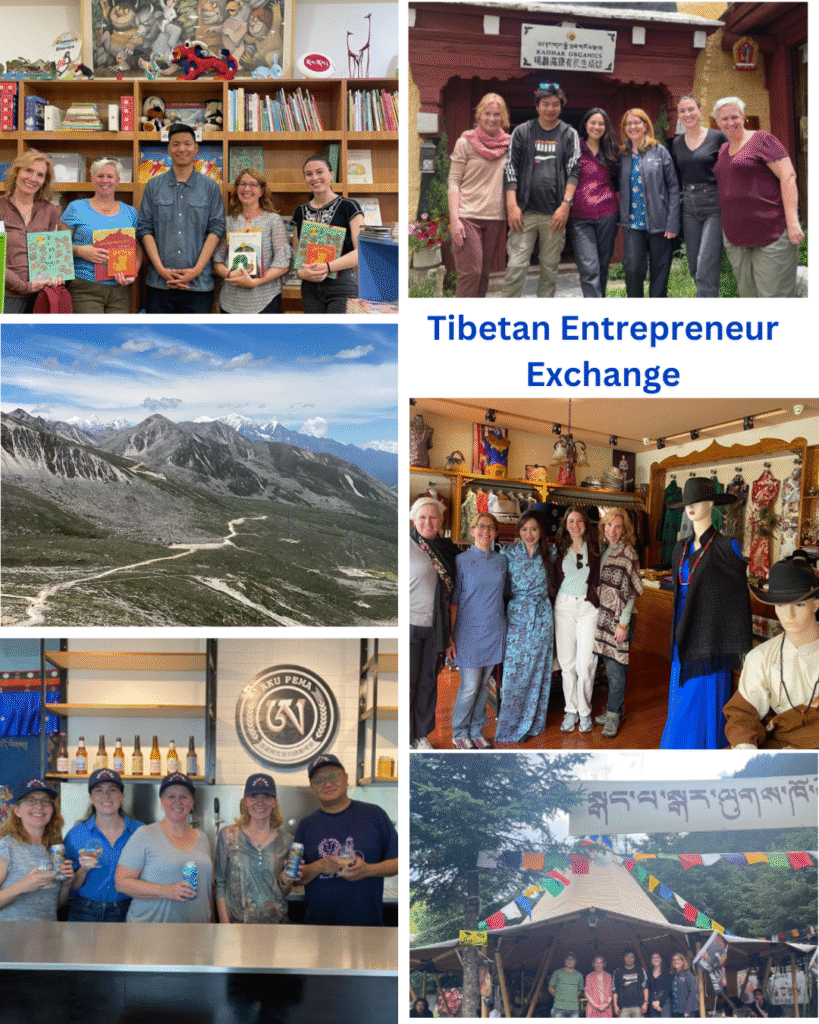Recently Magnolia Consulting was proudly recertified as a Certified B Corporation—an achievement that reflects our deep, ongoing commitment to using business as a force for good. Our mission is to cultivate learning and positive change for each other and those we serve, whether through our research, evaluation, or capacity-building services. (For more on what being a B Corp means to Magnolia, see our 2023 blog here.)
As part of this journey, I had a unique opportunity that brought these values to life in an unexpected place: Tibet. Through the University of Virginia’s Tibetan Business Entrepreneur Exchange Program, I was invited to lecture a group of Tibetan entrepreneurs on what it means to be a B Corp and how to pursue certification. In exchange, UVA sponsored an unforgettable, guided trip for me and three fellow U.S. lecturers to visit Tibetan business owners who completed the exchange program. Our travels took us across both Tibet and Tibetan areas of China, including Lhasa, Kangding, Litang, and Chengdu. The goal of our visits was simple yet profound: to learn from these entrepreneurs about their work, their values, and their stories.
What I discovered on this trip was that many of these Tibetan business owners are, in spirit and practice, already living the principles of a B Corporation—even if they’ve never heard of the certification.
In Litang, for example, we spent time with the co-founder of Kadhak Organics. This socially  conscious business provides income and training opportunities for Tibetan women, helping them gain economic independence while protecting the land through organic, sustainable farming methods. In Chengdu, we visited Blue Sheep Crafts, which supports Tibetan and Himalayan artisans—many of whom have disabilities—by offering a market for their handcrafted goods, keeping ancient cultural traditions alive while ensuring fair wages for local craftspeople.
conscious business provides income and training opportunities for Tibetan women, helping them gain economic independence while protecting the land through organic, sustainable farming methods. In Chengdu, we visited Blue Sheep Crafts, which supports Tibetan and Himalayan artisans—many of whom have disabilities—by offering a market for their handcrafted goods, keeping ancient cultural traditions alive while ensuring fair wages for local craftspeople.
Further along our journey in Lhasa, we visited Nor Nor children’s bookstore, a quiet haven dedicated to preserving Tibetan language, literature, and culture—a cultural mission that serves the entire community. Also in Lhasa is Aku Pema Brewery, founded by an entrepreneur who studied craft brewing during his exchange visit to UVA and brought those techniques home to create a beer that blends modern methods with traditional Tibetan ingredients and heritage—nurturing both culture and the local economy.
In total, we visited eleven Tibetan entrepreneurs. While each business had its own purpose and story, they shared core values that I find deeply familiar as a B Corp business owner:
- Warmth and Generosity. Every entrepreneur we met welcomed us with open arms, eager to share their stories and knowledge. Their kindness extended far beyond business—it reflected a deep care for people and place.
- Mission-Driven. Whether promoting Tibetan culture, creating jobs for women, or producing sustainable products, these businesses stay true to their purpose. Profit matters, but it does not come at the expense of mission or values.
- Resilient and Adaptive. These entrepreneurs face significant challenges—remote markets, limited resources, and the sociopolitical pressures of operating within a region where the preservation of Tibetan heritage faces ongoing pressures. Yet they meet these hurdles with flexibility, determination, and a growth mindset.
- Innovative and Entrepreneurial. Creativity fuels their success. From turning yak butter into premium skincare products to offering local brewery tours for tourists, these business owners adapt their strategies to survive and thrive.
- Socially and Environmentally Responsible. Nearly every business we visited emphasized sustainability—using local materials, minimizing environmental impact, and offering employment and training that lifts others in their communities.
Traveling across Tibet and Tibetan regions reminded me that being a B Corp is more than a certification—it’s a mindset. It starts from within, shaped by the desire to make a positive difference in the lives of others. These Tibetan entrepreneurs live this every day without formal recognition or labels, guided by tradition, community, and care for the earth.
This experience deepened my own resolve to stay true to Magnolia’s core values—especially now, as the business climate shifts in ways that are uncertain and sometimes difficult. Like these Tibetan entrepreneurs, I am reminded that challenges are part of every business journey. What matters most is how we respond—with creativity, resilience, and a fierce commitment to our mission. When the future feels unclear, I take heart in knowing that staying grounded in purpose gives us the strength to adapt, endure, and keep moving forward.
This journey has renewed my belief that no matter where we live—or what challenges we face—we all have the power to build businesses that are forces for good.

Leave A Comment